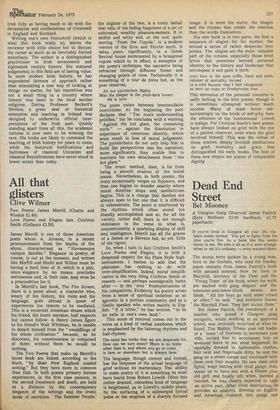All that glisters
Clive Wilmer
Two Poems James Merrill (Chatto and Windus £1.40) Love Poems and Elegies lain Crichton Smith (Gollancz 0.50) James Merrill is one of those American poets whom A. Alvarez, in a recent pronouncement from the depths of the abyss, characterised as " Stevenesque campus dandies." Elegance in poetry, of course, is out at the moment, and writers like Merfill and Hecht and Wilbur must be having a hard time of it: which is a pity, since elegance by no means precludes seriousness and, in their case, may even be a precondition for it.
In Merrill's last book, The Fire Screen, there is a poem about a character who, weary of his history, his roots and his language, goes abroad in quest of experiences too remote to be mediated. This is a recurrent American dream which his friend, the ironic narrator, half respects but cannot follow. A Henry James figure to his friend's Walt Whitman, he is unable to detach himself from the " swaddlings of his whole civilisation" because, as he discovers, his consciousness is composed of them: without them he would be nothing.
The Two Poems that make up Merrill's latest book are linked, according to the blurb, "by their New England coastal setting." But they have more in common than that. In both poems primary human experiences, in the first case passion, in the second transience and death, are held at a distance by the contemporary elegance of the settings •and the ironic mode of narration. 'The Summer People,' the slighter of the two, is a comic ballad that tells of the fading happiness of a set of cultivated, wealthy pleasure-seekers. It is skilful and witty and, at the end, quite moving. From the Cupola' is a modern version of the Eros and Psyche myth. It takes place, significantly, in a Greek Revival house surmounted by a hexagonal cupola which is, in effect, a metaphor of the poem's technique, the narrative being refracted through different forms and changing points of view. Technically it is something of a tour de force but, as the poet observes,
All our pyrotechnic flights Miss the sleeper in the pitch-dark breast. He is love.
The poem exists between irreconcilable convictions. At the beginning the poet declares that "Too much understanding petrifies," but he concludes with a warning "Against the hot glare, the consuming myth" — against the dissolution in experience of conscious identity, which must result in loss of moral judgement. The pyrotechnics do not only help him to build the perspectives into his narration; more significantly, they enable him to maintain his own detachment from "the hot glare."
The ironic method, then, is far from being a smooth evasion of the moral issues. Nevertheless, in both poems, the irony occasionally verges on flippancy, and then one begins to wonder exactly where moral doctrine stops and aestheticism begins. 'This is a charge that dandies are always open to but one that it is difficult to substantiate. The point is reinforced by the rhythms which often sound too blandly accomplished and so, for all the variety, rather dull; there is not enough resistance in the verse to what is, unquestionably, a sparkling display of skill and intelligence. Merrill has all the graces of a James or a Stevens but, as yet, little of the rigour.
So, when I turn to lain Crichton Smith's Love Poems and Elegies, it is with a deepened respect for his Plain Style highseriousness. I hasten to add that the plainness has nothing to do with over-simplification. Indeed, moral simplification is the very thing Crichton Smith so resents — and perhaps nostalgically harks after — in the iron ' Presbyterianism of his compatriots. Evidently his poetry arises from a sense of spiritual isolation: as an agnostic in a puritan community and as a Gaelic speaker who writes mainly in English. "It is bitter," he has written, "to be an exile in one's own land."
This sense of removal comes out in the verse as a kind of verbal numbness which is emphasised by the faltering rhythms and half-rhymes: The mind has tricks that we are desperate for. How can we turn away? Mere is no home other than it, and where you go or come is here or elsewhere but is always here.
The language, though correct and formal, has the limpness of the actual language of grief without its Marticulacy. The ability to make poetry of it is something he must have learnt from Robert Lowell. Often this rather drained, colourless kind of language is heightened, as in Lowell's middle phase, by the surfacing of a submerged lyrical pulse or the eruption of a sharply focused image. It is more the metre, the images and the rhymes that render the emotion than the words themselves.
His new book is in two parts, the first a sequence of elegies for his mother, the second a series of rather desperate love poems. The elegies are the more valuable part of the volume, especially those brief lyrics that penetrate beyond personal identity to the history and landscape that encompass it and gave it birth:
your face in he open coffin, fixed and stern, rebuker of mortality, incised to a cold hauteur that I half recognized as seen on coins or Presbyterian iron.
This extension of the personal concerns is sadly lacking in the love poems, though it is sometimes attempted without much success. Many of them hover embarrassingly on the brink of self-pity; here the influence of the 'confessional ' Lowell is malign. For Crichton Smith's best poems have always looked on grief with the eye of a patient observer, even when the grief involved himself. This was the virtue of those sombre, deeply Scottish meditations on grief, mortality and grace that distinguished his early books. The best of these new elegies are poems of comparable dignity.


































 Previous page
Previous page